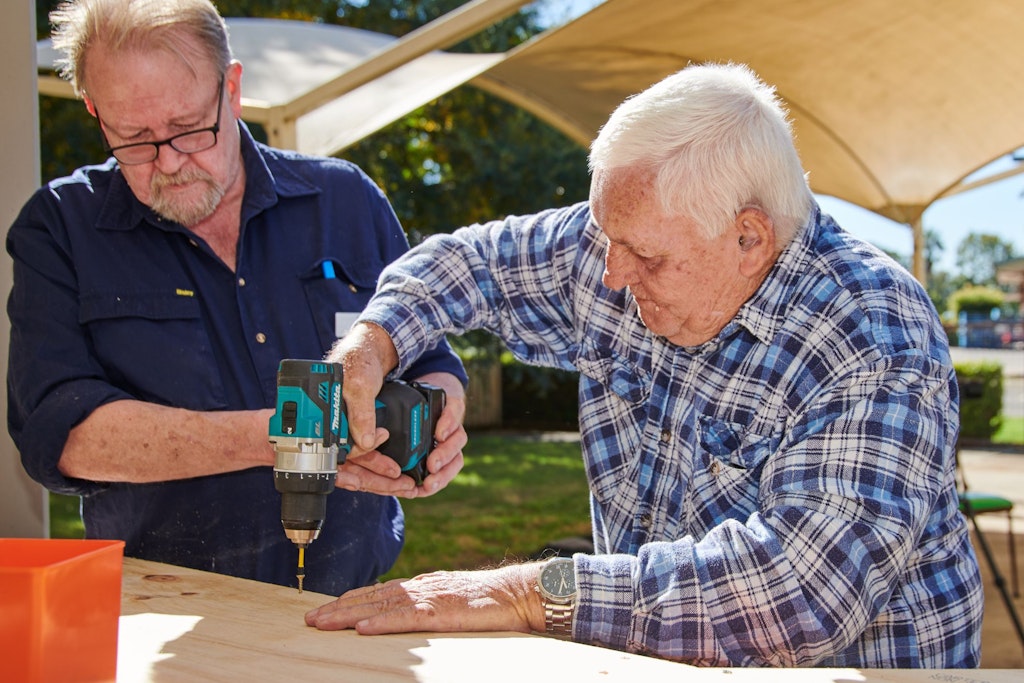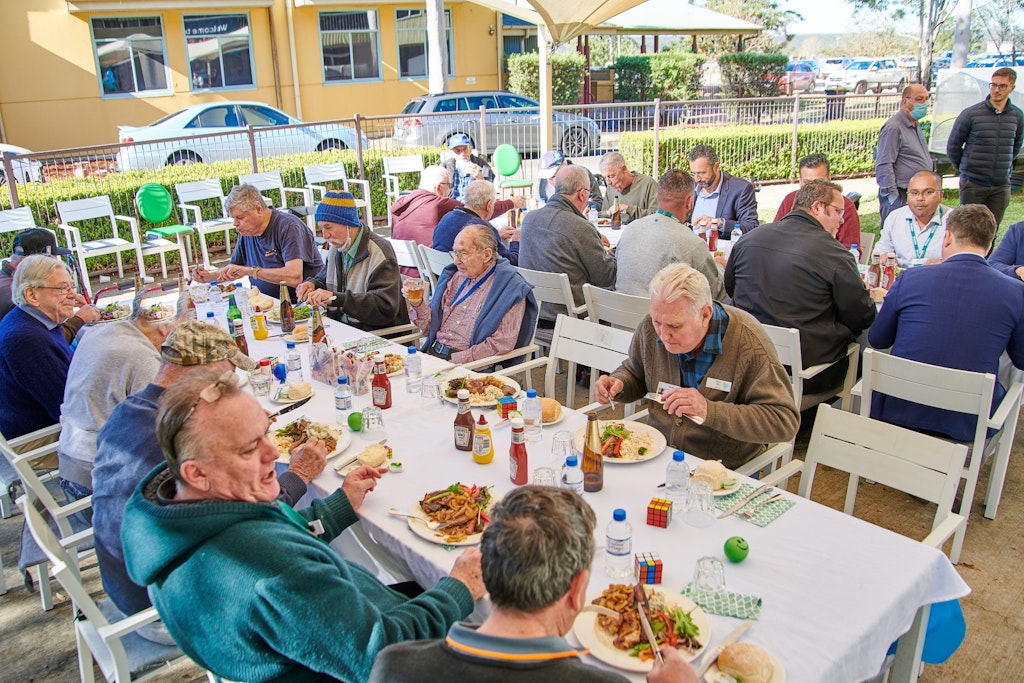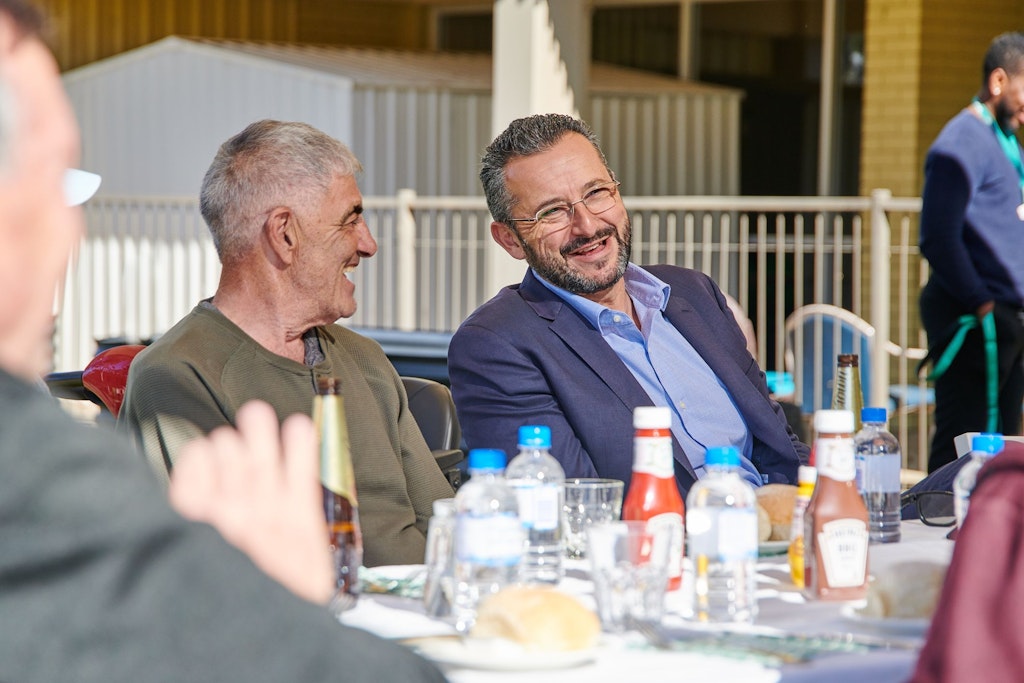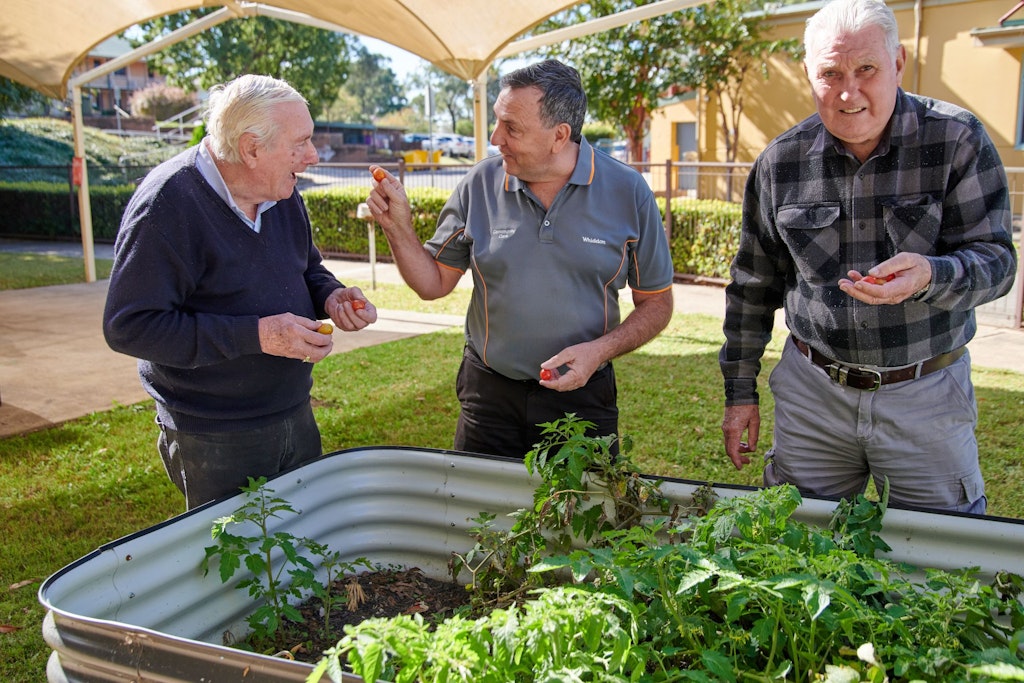Building identity: Embracing Men’s Sheds to promote purpose
Published on 21 January 2025 (Last updated on 13 February 2025)

We all strive for a sense of purpose throughout our lives, whether through our hobbies, passion projects, family life or career journey. However, ageing can often derail these attempts to maintain purpose as people exit the workforce, social circles shrink or the place called home changes.
One of the most innovative yet simple initiatives to combat those obstacles is the Men’s Shed. Men’s Sheds are a place for men of all ages, abilities and backgrounds to come together and make things, learn or teach skills, and socialise.
The first Men’s Sheds appeared at Whiddon over a decade ago. Whiddon Chief Executive Officer Chris Mamarelis told Hello Leaders their Men’s Sheds play a critical role in giving older men purpose. They also align perfectly with the organisation’s relationship-based care approach.
“Purpose is everything as you age, especially in the residential aged care environment. I can see the passion in our residents’ eyes when they’re going down to Men’s Shed. It brings something extra to their lives. That is critical in aged care,” Mr Mamarelis explained.
“I have seen how friendships and relationships evolve through the Men’s Shed and the importance of those relationships when the residents support each other.”
Supporting mental health
Support is particularly beneficial for those who have experienced loss or face mental health challenges. Research shows that 8% of men and 11% of women aged over 65 have experienced a mental health condition within the last 12 months. Examples include a broad range of anxiety, stress or mood disorders.
Additionally, research indicates two out of three people who enter residential aged care have mild symptoms of depression, while 16% were recorded with major symptoms of depression. Men aged 85 years and older also record the highest age-specific suicide rate of any group.
Mr Mamarelis highlighted why men need this opportunity to socialise and engage in lifelong hobbies.
“There are two layers to the benefits of Men’s Sheds. One is appealing to interests, skills and passion. You see that around in our homes. In Casino, the gentlemen are talented woodworkers and their craft is used for local fundraising,” he said.

“At Temora, there are a lot of ex-farmers so we get people to come in and talk to them about farming equipment. It keeps them connected with their community.
“The other dimension is social connection. Aged care is female-centric in terms of the population. Studies have shown that men can feel like they’re a numerical minority and negative feelings can be exacerbated by the ageing process attached to their loss of independence, physical strength, etc.
“Creating these social connections and connecting them with their passions and interests through Men’s Sheds helps them regain their identity.”
These opportunities to find their identity are not limited to aged care residents. Home care clients from Whiddon’s extensive community care network can also participate in Men’s Sheds activities. Clients are often handpicked by staff who recognise the need for socialisation and engagement.
“I’ve spoken to clients who’ve come in and they said these new connections have changed their lives because they’re socially isolated at home. It’s such a valuable initiative and support mechanism that we can provide,” Mr Mamarelis added.
Identity built on a common name
At the heart of Whiddon’s support of its Men’s Sheds is a move to strengthen the sense of identity: it has officially added its branding to establish the ‘Whiddon Men’s Shed’.
Mr Mamarelis said the name change elevates belonging and purpose, allowing the men to feel included in a club of their own. There is also the hope it will act as a beacon for others who remain undecided about joining.

“Residents can see there are processes and structures and they can belong to a Whiddon Men’s Shed. One of the sad aspects for older people, in general, is we tend to trivialise things. Attaching a brand to it gives the residents something to be proud of,” he said.
“There is a bit of fun involved as we also tried to mix the skill set, symbolised with the hammer, alongside the beer to highlight the social elements.”
Staff have also found purpose with the Whiddon Men’s Shed as fun activities provide rewarding engagement and relationship building.
“There’s a lot of interaction. They see the benefits. The trick in aged care is giving your people the licence to spend that quality time with residents. In that task-based environment, it’s difficult, but we’re getting better,” Mr Mamarelis said.
Positive outcomes for residents
Ultimately, the feel-good stories show how invaluable the initiative is. Take the ex-farmers from Temora. Simply talking to a local agricultural supply company representative about the latest farming equipment meant the world to them.
“That was their life so those interactions keep them connected to their interests. It’s keeping them connected to their community. There was a lot of banter and discussion. Beautiful to see and the benefits are multifaceted,” Mr Mamarelis said.

Then there are the opportunities for staff and resident interactions to deliver positive outcomes. Mick, a resident in one of Whiddon’s North Coast homes, loved riding motorbikes but couldn’t anymore due to his age. That didn’t stop Whiddon from helping him get back on the saddle.
“We brought in a motorbike with a sidecar, took Mick out for a couple of hours, and he was on cloud nine. He had one of the best days and didn’t stop talking about it for the rest of the week,” Mr Mamarelis added.
“You saw the team around him feel the impact, even a staff member was crying. There’s this beautiful outcome for everyone through the privilege of being able to do these things for our elders.”
Mr Mamarelis reinforced that it doesn’t take much to establish a Men’s Shed. Even the shed is optional because any space can be used as long as there’s the will to make a difference.
Grants and funding opportunities are also available through the Australian Government, providing additional incentives for aged care providers to embrace Men’s Sheds.
“Providers need to ensure they’re investing in these things and we’re thinking about the needs of our diverse populations. That includes the males in residential care. The more we see Men’s Sheds grow through aged care the better,” Mr Mamarelis added.